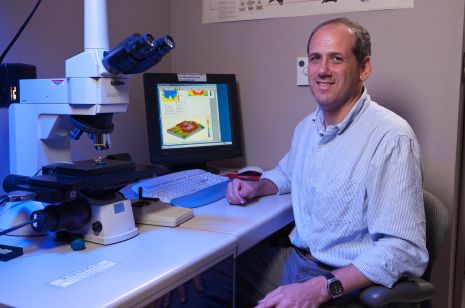
FAYETTEVILLE, Ark. – Plants and fungi have cell walls, animals have thick muscles, and teeth have half of a billion years of evolution to eat – and beat – them all. Teeth: A Very Short Introduction by Peter Ungar, professor of anthropology at the University of Arkansas, offers 137 pages of information about how teeth evolved to break down material without losing their own.
“It’s a perpetual death match in the mouth, with plants and animals developing tough or hard tissues for protection, and teeth evolving ways to sharpen or strength themselves to overcome those defenses,” Ungar wrote in his new book.
Chewing allows mammals to break cells to access vital nutrients. The smaller the food particles the more surface area the digestive enzymes have to break down those components on the chemical level. The intestines more readily absorb smaller particles, so the more chewing, the more nutritional value.
“Teeth help us understand ecology,” Ungar wrote. “Teeth matter because they are right in the middle of it, mediating between eater and eaten.”
The type of food also determines the structure of teeth. Looking at the structure of fossilized teeth, anthropologists can distinguish between not just herbivorous versus carnivorous eating habits, but the climate mammals lived in. The more chewing, the more energy released to maintain body temperature in cooler climates.
People value teeth for more than nutrition and energy, according to Unger. We judge others by their smile.
“A recent survey of nearly 5,500 American singles by the online dating service Match.com found teeth to be the No. 1 attribute both men and women use to judge potential partners,” Ungar wrote. “Yes, teeth matter.”
Teeth: A Very Short Introduction is part of the Very Short Introduction series published by Oxford University Press. Books in the series aim to make challenging topics interesting and readable for a mainstream audience.
Ungar is a Distinguished Professor of anthropology, the chair of the department of anthropology and a faculty member of the environmental dynamics doctoral program at the University of Arkansas. He researches the diets of modern primates, early hominins and the mammals coexisting with early hominins. He is author or co-author of more than 130 scientific papers and author of Mammalian Teeth: Origin, Evolution, and Diversity, published by Johns Hopkins University Press.
Contacts
Peter S. Ungar, Distinguished Professor, anthropology
J. William Fulbright College of Arts and Sciences
479-575-6361,
Leah Markum, Intern
University of Arkansas
479-575-5555,
Barbara Jaquish, science and research communications officer
University Relations
479-575-2683,